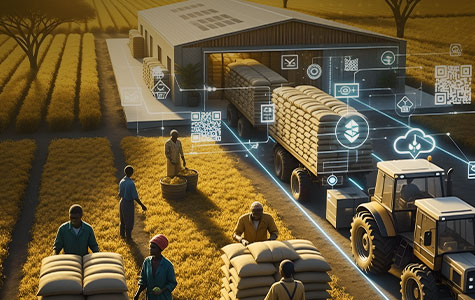West African nations stand at a critical juncture in their agricultural development. As global food demand rises and climate change intensifies, the need for efficient, data-driven agricultural systems has never been more pressing. However, many West African countries face a significant hurdle: the absence of comprehensive digital farmer registries and the technological infrastructure to support them. This gap not only hampers agricultural productivity but also impedes the effective implementation of targeted policies and interventions.
.jpg)
The Current Landscape: A Fragmented Agricultural Data Ecosystem
West Africa's agricultural sector is characterized by a predominance of smallholder farmers, with an estimated 80% of farms in the region being less than 2 hectares in size (FAO, 2020). This fragmentation presents a unique challenge for governments attempting to collect and digitize farmer data. Unlike in more industrialized agricultural systems, where large-scale commercial farms dominate, West African governments must contend with millions of individual smallholdings, each with its own unique characteristics and needs.
Nigeria's Attempted Farmer Registration
Nigeria, the most populous country in West Africa, attempted to address this challenge through its Growth Enhancement Support Scheme (GESS) in 2012. The program aimed to create a comprehensive database of farmers to facilitate the distribution of subsidized inputs. However, the initiative faced significant hurdles:
- Infrastructure limitations: Poor internet connectivity in rural areas hindered data collection and real-time updates.
- Digital literacy: Many farmers lacked the skills to interact with digital platforms, leading to incomplete or inaccurate data.
- Resource constraints: The sheer scale of the task overwhelmed the available human and financial resources.
As a result, while the GESS registered over 10 million farmers, the database remained incomplete and quickly became outdated (World Bank, 2019).
The Ripple Effect: Consequences of Absent Digital Registries
The lack of comprehensive digital farmer registries has far-reaching implications for West African agriculture and governance. Without accurate data on farm sizes, crop types, and yields, governments struggle to allocate resources effectively. This leads to suboptimal distribution of subsidies, inputs, and extension services, resulting in inefficient resource allocation across the agricultural sector.
Furthermore, the absence of reliable farmer data severely limits access to financial services. Banks and microfinance institutions lack the necessary information to assess credit risk, resulting in restricted access to loans for smallholder farmers. This financial exclusion hinders farm investments and growth, perpetuating cycles of low productivity and poverty.
Policymakers, too, are hampered by this data deficit. Operating in an information vacuum makes it difficult to design targeted interventions that address the specific needs of different farmer segments. As a result, agricultural policies often fail to achieve their intended impacts, leading to wasted resources and missed opportunities for sector development.
The lack of detailed, localized agricultural data also increases vulnerability to climate shocks. Without comprehensive farmer registries, it becomes challenging to develop effective early warning systems and climate adaptation strategies. This leaves farmers and communities exposed to the intensifying impacts of climate change, threatening food security and livelihoods.
Lastly, the absence of digital farmer registries creates significant barriers to market access. Without verifiable farmer identities and production data, it becomes challenging to integrate smallholders into formal value chains and export markets. This exclusion from higher-value markets limits income opportunities for farmers and hinders the overall competitiveness of West African agriculture in the global marketplace.
.jpg)
Technological Hurdles: The Root of the Problem
The creation of digital farmer registries in West Africa is hindered by several technological challenges:
1. Limited ICT Infrastructure
West African nations lag behind in Information and Communication Technology (ICT) infrastructure. According to the International Telecommunication Union (2021), internet penetration in West Africa stands at approximately 42%, significantly lower than the global average of 63%. This digital divide is even more pronounced in rural areas, where most farmers reside.
Ghana's e-Agriculture Program
Ghana's e-Agriculture program, launched in 2011, aimed to leverage ICT for agricultural development. However, the initiative faced significant challenges due to poor connectivity in rural areas. A study by the University of Ghana (2018) found that only 32% of rural farmers had reliable access to the internet, severely limiting the program's reach and effectiveness.
2. Data Collection and Management Challenges
The sheer volume and complexity of data required for comprehensive farmer registries pose significant challenges:
- Data accuracy: Ensuring the accuracy of self-reported data from millions of smallholder farmers is a daunting task.
- Data standardization: Inconsistent data formats across different regions and agencies complicate integration efforts.
- Data security: Protecting sensitive farmer information from breaches and unauthorized access requires robust cybersecurity measures, which are often lacking.
3. Interoperability Issues
The absence of standardized systems and protocols hinders data sharing between different government agencies and stakeholders. This lack of interoperability results in siloed information and duplicated efforts.
4. Limited Digital Literacy
Many smallholder farmers have low levels of digital literacy, making it difficult for them to engage with digital registration systems. A survey conducted by the African Development Bank (2020) in six West African countries found that only 23% of rural farmers were comfortable using smartphones or computers for agricultural purposes.
5. Power Supply Constraints
Unreliable electricity supply in many rural areas poses a significant challenge to the implementation and maintenance of digital systems. The World Bank (2021) reports that only 48% of the West African population has access to electricity, with rural areas faring much worse.
Bridging the Gap: Potential Solutions and Interventions
Despite these challenges, there are promising approaches that West African governments can adopt to create and maintain digital farmer registries:
1. Mobile-First Strategies
Given the higher penetration of mobile phones compared to computers in rural West Africa, governments should prioritize mobile-based solutions for farmer registration and data collection.
Mali's N'kalô Project: The N'kalô project in Mali leverages SMS and voice messages to provide market information to farmers. This model could be adapted for farmer registration, allowing farmers to submit and update their information via basic mobile phones.
2. Public-Private Partnerships (PPPs)
Collaborating with private sector technology companies can help governments overcome resource and expertise constraints.
Ethiopia's Digital Green Initiative: While not in West Africa, Ethiopia's partnership with Digital Green, a non-profit organization, offers valuable lessons. The initiative uses locally produced videos to disseminate agricultural information and collect farmer data, reaching over 2 million smallholder farmers (Digital Green, 2022).
3. Blockchain Technology for Data Integrity
Blockchain can provide a secure, transparent, and tamper-proof system for maintaining farmer registries.
AgriLedger in Haiti: AgriLedger, a blockchain-based platform, was piloted in Haiti to create secure digital identities for farmers and track agricultural supply chains. Similar technology could be adapted for West African contexts to ensure the integrity of farmer registries.
4. Capacity Building and Digital Literacy Programs
Investing in digital literacy programs for farmers and agricultural extension workers is crucial for the successful implementation of digital registries.
Senegal's e-Extension Program: Senegal's e-Extension program, launched in 2014, trains agricultural extension workers in ICT skills, enabling them to collect farmer data and provide digital advisory services. The program has reached over 100,000 farmers (FAO, 2019).
5. Leveraging Satellite Technology and Remote Sensing
Satellite imagery and remote sensing can complement ground-level data collection, providing valuable information on farm sizes, crop types, and land use patterns.
Nigeria's Space Agency Initiative: Nigeria's National Space Research and Development Agency (NASRDA) has begun using satellite technology to map agricultural lands and monitor crop health. This technology could be integrated with farmer registries to provide a more comprehensive view of the agricultural landscape.
.jpg)
The Way Forward: A Call for Coordinated Action
Creating comprehensive digital farmer registries requires a multifaceted approach and coordinated efforts from various stakeholders. At the forefront, government leadership is crucial. Governments must prioritize the development of digital agricultural strategies and allocate sufficient resources for their implementation. This high-level commitment is essential to drive the necessary changes and overcome institutional inertia.
International cooperation also plays a vital role in this endeavour. Regional bodies like ECOWAS (Economic Community of West African States) can be instrumental in standardizing approaches and facilitating cross-border data sharing. This regional coordination can lead to more efficient use of resources and the creation of interoperable systems that benefit all member states.
The support of international donors and development agencies is equally important. These organizations should align their interventions with national digital agriculture strategies and provide long-term support for capacity building. This sustained commitment can help bridge the resource and expertise gaps that many West African countries face in implementing large-scale digital initiatives.
Private sector engagement is another critical component of this strategy. Governments should encourage private sector investment in agricultural technology and create incentives for companies to develop solutions tailored to local contexts. This can spur innovation and bring in much-needed technical expertise and resources.
Farmer participation must be at the heart of these efforts. It's essential to ensure that smallholder farmers are actively involved in the design and implementation of digital registration systems. This participatory approach helps address the specific needs and concerns of farmers, increasing the likelihood of widespread adoption and sustainable use of these digital tools. By incorporating farmers' perspectives, these systems can be made more user-friendly and relevant to the realities of agriculture.
The absence of comprehensive digital farmer registries in these nations represents a significant obstacle to agricultural development and effective governance. However, by leveraging innovative technologies, fostering partnerships, and investing in digital infrastructure and literacy, they can overcome such daunting challenges. The creation of robust digital farmer registries will not only enhance agricultural productivity but also pave the way for data-driven policymaking, improved resource allocation, and greater inclusion of smallholder farmers in the formal economy. As West Africa stands on the brink of a digital agricultural revolution, the time for decisive action is now.
At CSM, we blend technology with policy frameworks, bridging digital divides through citizen-centric applications. Be it the citizen registry in Gambia, the PSNP registry in Ethiopia or the farmer registry in Odisha, we have created ‘golden records’ or ‘single source of truth’ for governments across the world to improve their policy interventions and subsequent outcomes.










































We will verify and publish your comment soon.